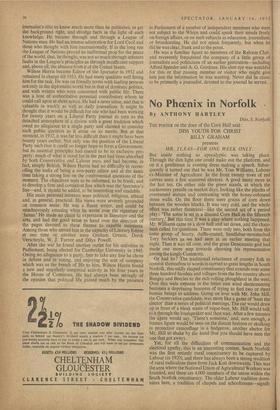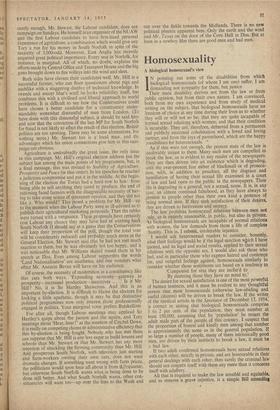No Phoenix in Norfolk
By ANTHONY HARTLEY Diss, S. Norfolk
THE POSTER on the door of the Corn Hall said DISS YOUTH FOR CHRIST BILLY GRAHAM presents
MR. TEXAS—FOR ONE WEEK ONLY.
But inside nothing so apocalyptic was taking place. Through the dim light one could make out the platform, and on it a gentleman in evening dress making a speech. Subse- quently it turned out that he was Mr. Torn Williams, Labour ex-Minister of Agriculture. In the front twenty rows of red canvas seats a few scattered electors. A good many more in the last ten. On either side the green stands, at which the auctioneers preside on market days, looking like the plinths of overturned statues and contrasting with the honey-coloured stone walls. On the floor there were grains of corn down between the wooden blocks. It was very cold, and the whole effect was rather theatrical—like the second act of a period play : 'The scene is set in a disused Corn Hall in the fifteenth century.' But this time it was a play where nothing happened. Mr. Williams came to a slow halt and sat down, and the chair- man called for questions. There were only two, both from the same group of hearty, duffle-coated, handlebar-moustached Tory hecklers as we had seen at an earlier meeting that night. Then it was all over, and the great Democratic god had made one more step towards choosing his representative among the kingly Commons. Or had he? The traditional reluctance of country folk to commit themselves to words is carried to great lengths in South Norfolk, this oddly shaped constituency that extends over sonic three hundred hamlets and villages from the fen country above Bungay and Beccles to the rich rolling ploughland in the west. Over this wide expanse in the bitter east wind electioneering becomes a depressing business of trying to find two or three human beings to address. Going on tour with Mr. John Hill, the Conservative candidate, was more like a game of 'hunt the elector' than a series of political meetings. The car would draw up in front of a bleak waste of sugar-beet, Mr. Hill would talk to it through the loudspeaker and then wait. After a few minutes the agent would say, 'There's someone,' and, sure enough, a human figure would be seen on the distant horizon or skulking in protective camouflage in a hedgerow, another elector for Mr. Hill to shake by the hand (but you should have seen the one that got away). Yet, for all the difficulties of communication and the electoral apathy, this is an interesting contest. South Norfolk was the first entirely rural constituency to be captured by Labour (in 1920), and there has always been a strong tradition of rural radicalism there from Jack Kett downwards. This was the area where the National Union of Agricultural Workers was founded, and there are 4,000 members of the union within the South Norfolk constituency. The older Labour tradition domi- nates here, a tradition of chapels and schoolrooms—signifl- candy enough, Mr. Stewart, the Labour candidate, does not campaign on Sundays. He himself is an organiser of the NUAW and the first Labour candidate to have first-hand personal experience of agriculture, a combination which would give any Tory a run for his money in South Norfolk in spite of the majority of 3,000-odd. Moreover, East Anglia has recently acquired great political importance. Every seat in Norfolk, for instance, is marginal. All of which, no doubt, explains the efforts made by Central Office and Transport House and the big guns brought down to fire volleys into the wind and sleet.
Both sides have chosen their candidates well. Mr. Hill is a successful farmer, who can floor questioners about pigs and suchlike with a staggering display of technical knowledge. In tweeds and soccer blue's scarf he looks reliability itself, but combines this with a civilised and liberal approach to world problems. It is difficult to see how the Conservatives could have chosen a better candidate for a constituency under- standably somewhat distrustful of men from London. (To have done with this distasteful subject, it should be said here and now that the conviction of the last MP for South Norfolk for fraud is not likely to affect the result of this election. British politics are too sporting. There may be some abstentions, but nothing more.) Mr. Stewart too is a' local man, and the advantages which his union connections give him in this cam- paign are obvious.
Agriculture is undoubtedly the great issue, the only issue in this campaign. Mr. Hill's original election address put the subject last among the main points of his programme, but, in a final message, this was revised to Stability of Agriculture, Prosperity and Peace (in that order). In his speeches he reached a judicious compromise and put it in the middle. At the begin- ning of the election the Tories had a hard row to hoe : from being able to sell anything they cared to produce, the end of rationing faced farmers with the disagreeable necessity of hav- ing to take some notice of consumer opinion, and they did not like it. Who would? This posed a problem for Mr. Hill—up to the moment when the Labour Party were so ill-advised as to publish their agricultural marketing proposals. Then the tables were turned with a vengeance. These proposals have certainly cost Labour any chance they may have had of winning back South Norfolk (I should say at a guess that the Conservatives will keep their proportion of the poll, though the total vote will be considerably reduced) and provably much more at the General Election. Mr. Stewart said that he had not met much reaction to them, but he was obviously not too happy, and it was noticeable that Mr. Williams skated round them in his speech at Diss. Even among Labour supporters the words 'Land Nationalisation' are anathema, and one wonders what effect Mr. Aneurin Bevan will have on his audience.
Of course, the necessity of moderation in a constituency like this cuts both ways. 'Expanding economy—gateway to prosperity—increased production—incentives . . Is it Mr. Hill? No, it is Sir Hartley Shawcross. And this is an important by-election. It is difficult to blame the electors for looking a little apathetic, though it may be that distinctive political programmes now only interest those professionally engaged in politics. Your marginal voter prefers Butskellism For after all, though 'Labour meetings may applaud Sir Hartley's quips about the parson and the squire, and Tory meetings shout 'Hear, hear!' at the mention of Crichel Down, it is really on competing claims to administrative efficiency that this by-election is being fought. Nobody who has met them can suppose that Mr. Hill is any less eager to build houses and schools than Mr. Stewart or that Mr. Stewart has any more intention of shackling the farming community than Mr. Hill. And prosperous South Norfolk. with television just starting and farm-workers owning their own cars, does not want dramatic changes. If something went wrong with farm prices, the politicians would soon hear all about it from thin, quarter, but otherwise South Norfolk wants what is being done to be done still better. And what South Norfolk wants, other con- , stituencies will want too—up over the fens to the Wash and out over the fields towards the Midlands. There is no new political phoenix apparent here. Only the earth and the wind and Mr. Texas on the door of the Corn Hall in Diss. But at least in a cowboy film there are good men and bad men.



































 Previous page
Previous page